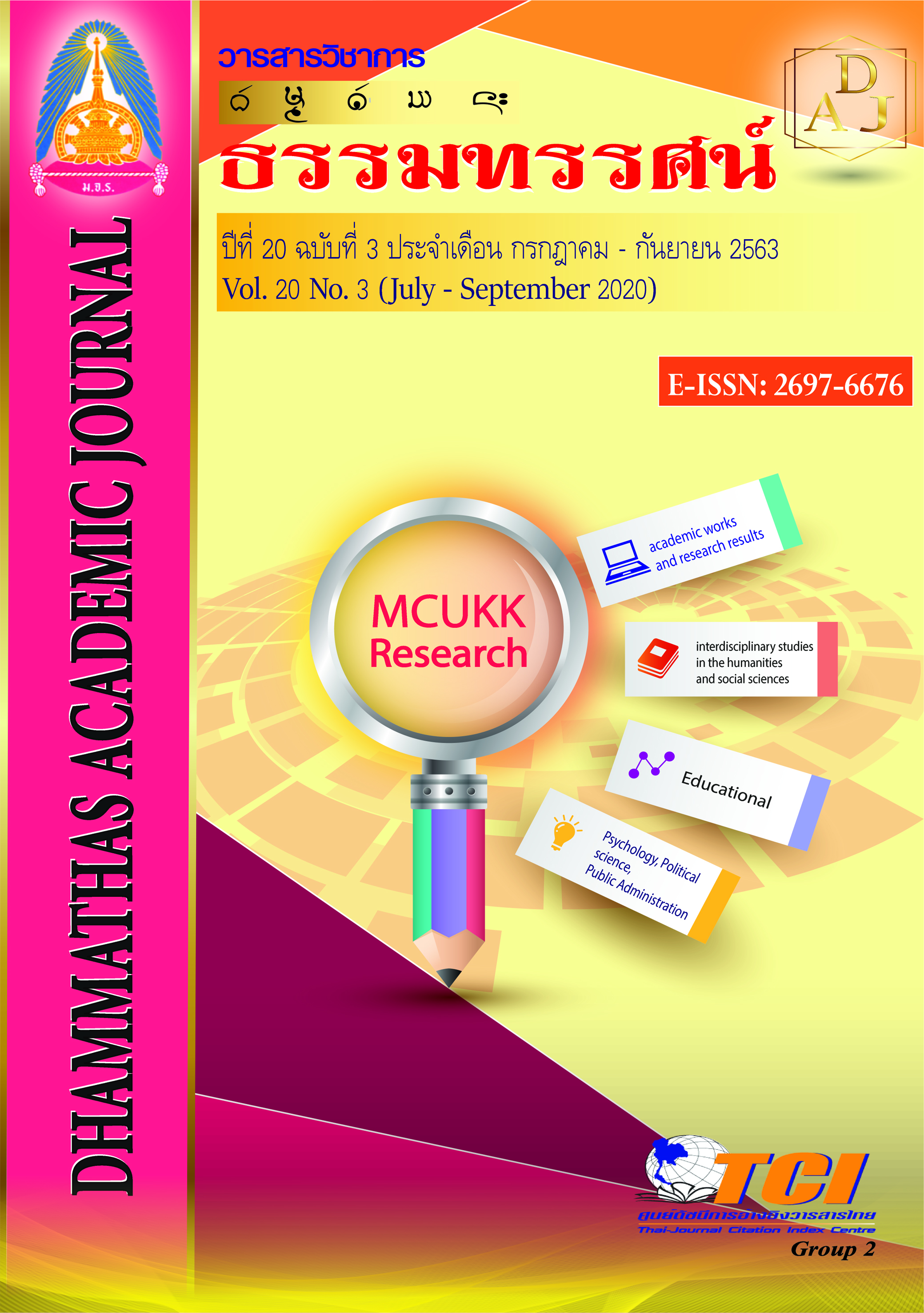Developing the teacher’s Innovative Leadership Enhancement Program for the General Education Private School under Kalasin Provincial Education Office
Main Article Content
Abstract
This research of objective to: 1) study current conditions, desirable conditions, 2) develop in teacher’s Innovative Leadership Enhancement Program for the General Education Private School under Kalasin Provincial this study used qualitative research were 2 phases. The first phases was study current conditions and desirable conditions in teacher’s Innovative Leadership Enhancement Program. The samples consisted of 291 school administrators and teachers. The research instrument was the questionnaire. The statistics used for analyzing data were frequency, percentage, mean and standard deviation. The second phase was develop in teacher’s Innovative Leadership Enhancement Program. Focus group discussion included 7 professionals as informants. The research instrument was the interview form, evaluation form. The statistics used for analyzing data were mean and standard deviation.
The results of Study were Found:
1. Result of the current conditions and desirable conditions in teacher’s Innovative Leadership Enhancement Program at high level in all items.
2. Result of development in teacher’s Innovative Leadership Enhancement Program include 5 categories. The first category principle. The second category was purposes. The third category was a content are 5 modules, 1) personality, 2) vision, 3) role, 4) Creative, 5) management in an organization. The fourth category was a method of operation. The fifth was an evaluation and the results for the assessment the suitability and the possibility of the program were suitability and the possibility of the program are at high level. However, used the program. Too long development problems should be avoided by choosing to develop one course at a time to complete all 5 courses. The eligibility of the developer was defined or provide opportunities for teachers who are newly appointed or teachers who are prepared for development first. In addition, learning may be provided in the form of online lessons that have the same content as the proposed format activities. To be a source of knowledge for those who are interested.
Article Details
References
Barr, M. J. and Keating, L. A. (1990). Introduction: Elements of program development, Developing Effective Student Services Program. San Francisco : Jossey-Bass Publishers.
Buasri, T. (1999). Curriculum theory, design and development. Bangkok : Thana chat Printing.
Chaipasit, S. (2010). Innovative organization: An alternative for modern entrepreneur. Bangkok : Bangkok University.
Higgins, J. M. (1995). Innovate or Evaporate: Test & Improve Your Organization’s IQ-Its Innovation Quotient. New York : New Management Publishing Company.
Jong, J. P. and Den Hartog, D. N. (2007). How Leaders Influence Employees' Innovative Behaviour. European Journal of Innovation Management, 10(1), 41-64.
Kanchanapokin, K. (2018). Innovation leadership. http://www.bangkokbiznews.com/blog/detail/466874 (Accessed 20 February 2018).
Klaus, S. (2015). The Global Competitiveness Report 2013-2014. World Economic Forum. Geneva : Switzerland.
Kongsuk, J. (1997). Development of a parent educational program for fostering preschool children's physical development using participatory rural appraisal model. Master of Education. Graduate School : Chulalongkorn University.
Korkeathikun, C. (2010). A Study on Relationships Among Teachers’ Characteristics, Leader Behaviors, Knowledge Sharing and Information and Communication Technology Utilization, with Learning Dynamics of Secondary School Teachers Under the Office of the Basic Education Commission, Bangkok Metropolis. Master of Education Program. Graduate School : Chulalongkorn University.
Meesuk, P. (2009). Effects of Teacher Participatory Program Design for Teacher Professional Development. Bangkok : Chulalongkorn University.
National Innovation Agency. (2004). Innovation management for executives. Bangkok : National Innovation Agency (Public Organization).
Office of the National Economic and Social Development Council. (2016). Summary of the National Economic and Social Development Plan No. 12 (B.E. 2560-2564). Bangkok : Office of the National Economic and Social Development Council.
Pakdeelao, W. (2011). The Study of Characteristics of Innovative Organization: Case Studies from Awarded Organization. Master of Science. Graduate School : National Institute of Development Administration.
Rojwattanabol, O. (2011). Model of factors influencing innovative leader. Doctor of Public Administration. Graduate School : Faculty of Public Administration, National Institute of Development Administration.
Sherwood, D. (2001). Smart Things to Know About Innovation & Creativity. Oxford : Capstone Publishing Limited.
Singthong, K. (2018). The Development of Intelligence Creative Leadership Program for Teachers in Schools Under The Secondary Educational Service Area Office 20. Master of Education Program. Graduate School : Mahasarakham University.
Srisa-ard, B. (2010). Preliminary research. Bangkok : Suweeriyasarn.
Udomsak, K. (2012). Leader’s Behaviors that Influence Employee’s Behaviors to form Innovative Culture in the Organization: A Case Study of Pan Rajdhevee Group Public Company Limited and Affiliated Companies. Journal of Humanities and Social Sciences Thonburi University, 7(14), 93-105.
Von, S. B. (2008). Managing Innovation, Design and Creativity. Chichester : John Wiley & Sons.
Yasingthong, W. (2017). Innovative Leadership Affecting Teachers Learning under the Secondary Education Service Area Office25. Journal of Education Khon Kaen University (Graduate Studies Research), 11(3), 234-244.

